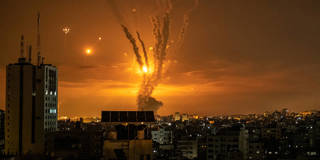RICHARD HAASS

The advantage historians have over journalists is that the passage of time offers them a perspective not available to those with immediate deadlines. But the year is about to end, which constitutes a firm deadline if the goal is to put 2023 into perspective. “Instant history” may well be an oxymoron, but it is worth the effort, especially in a year that will be remembered as one defined by war.
Two wars in particular stand out. The first is Russia’s continuing aggression in Ukraine. While Ukraine continued to hold its own against Russian forces and remains a viable, independent country that controls roughly 80% of its territory, the much-anticipated Ukrainian counter-offensive accomplished little. All told, the second year of this costly war will be known less for what changed on the field of battle than for what did not; the map does not look all that different in December than it did in January. Meanwhile, some cracks appeared in support for Ukraine in both Europe and the United States.
The second war was initiated by Hamas against Israel on October 7. Surprising Israeli intelligence and defense forces, Hamas’s savage terrorist attacks killed more than 1,200 people, with another 240 taken hostage. Most of the victims were civilians.
Israel declared as its goal the elimination of Hamas and has attacked Gaza heavily ever since, first by air and then on the ground, killing nearly 20,000 people so far and displacing almost two million. In its third month, the war shows no sign of ending. When it does, Israeli occupation of Gaza is likely to follow, but what will follow that is unknown. Prospects for peace and a Palestinian state appear more remote than ever.
Not surprisingly, the most important bilateral relationship of this era, between the US and China, also dominated headlines in 2023. The year began with a Chinese spy balloon traversing the US, prompting the US to shoot it down. Relations entered something of a deep freeze until high-level contacts resumed over the summer, culminating in a meeting between President Joe Biden and President Xi Jinping in San Francisco in November.
Both leaders want a calmer relationship, albeit for very different reasons. China is hoping for improved economic ties, while the US wants to prevent China from adding to global turbulence by undertaking aggression in the Taiwan Strait or the South China Sea or by providing military assistance to Russia. Without a shared approach to the major issues of the day, any floor under the relationship will be shaky at best.
That said, it is important to note two things that did not happen in 2023. There was no Taiwan crisis or incident that threatened to provoke a conflict between China and the US. China ended the year focusing mostly on its economy and on beginning a necessary transition toward domestic-demand-led growth. Given the reluctance of Chinese households to spend rather than save, it will be a difficult transition.
Nor was there a crisis involving North Korea. A widely-predicted seventh nuclear test never materialized. Just why Kim Jong-un refrained is unclear, but what is clear is that North Korea continued to increase the quantity and quality of its nuclear and missile forces, and even enshrined their further development in a constitutional amendment.
What also did not happen is any concerted response to these developments on the part of South Korea, Japan, or the US, although America attempted to allay growing concerns in South Korea about the reliability of extended deterrence.
The year will also be remembered for being the hottest on record. World leaders, CEOs, lobbyists, and activists gathered in Dubai for the United Nations Climate Change Conference (COP28). But the mismatch between their efforts and the urgency of the problem raised more troubling questions about the world’s willingness to come together to address what could prove to be the defining challenge of the century.
Artificial intelligence had a breakthrough year in 2023, gaining broad public recognition as a transformative technology. Some hesitant steps at regulation were taken, but AI is evolving faster than governments can grasp the implications, and policymakers are wary of closing off potentially beneficial applications. As a result, the world is more likely to be affected by AI than affect its development.
Populism remained the year’s dominant political trait. Outsiders, or insiders who acted like outsiders, had a good year. This would apply to existing leadership in India and new leadership in Argentina, the Netherlands, and Slovakia. Regardless of their objective circumstances, more people are frustrated and pessimistic than content and optimistic.
We can end on an upbeat note, however. The US economy was a rare bright spot in 2023, with inflation declining alongside steady economic growth. Indeed, the year ended with stock markets near all-time highs, owing to investors’ belief that inflation could be reduced without triggering a recession. Prospects for a so-called soft landing appeared bright.
The most surprising development of the year might well have been the rapprochement between Japan and South Korea. Helped by some creative American diplomacy and made possible by the willingness of South Korean President Yoon Suk Yeol and Japanese Prime Minister Fumio Kishida to take some political risk, the bilateral relationship has become closer than at any time since the end of World War II. In a world in which we have been reminded of the reality of war, it was reassuring to see these two former foes enter a new era. It is a welcome reminder that positive outcomes are still possible.
No comments:
Post a Comment